The insurrection at the Capitol on Jan. 6 and the inauguration of President Joe Biden on Jan. 20 sparked discussions within the school community, causing many students and teachers to reflect upon the historic events of the new year.
During the riots, thousands of people stormed the Capitol building and disrupted the joint Congress session during the counting of electoral votes and the certification of Biden’s victory. According to the New York Times, the violence resulted in five deaths, and the Federal Bureau of Investigation (FBI) arrested over 125 individuals.
Former President Donald Trump made false claims of election fraud and encouraged the rioters during a speech made Jan. 6. Prominent figures such as Trump’s personal lawyer Rudy Giuliani and Donald Trump Jr. made charged statements as well.
Members of the school reflect on the Capitol riots and their effects on the community
History Teacher Jennifer Marcus said unreliable media organizations spreading false information about the legitimacy of the election were to blame for the insurrection.
“I think that the biggest challenge for our democracy is, ‘how do you allow free exchange of ideas and root out extremism and hate speech?’” Marcus said. “And I wonder what the future is for the First Amendment. I wonder what the future is for the protection of this kind of vile language and these vile symbols?”
The way leaders handled the riots shone a light on the double standard between white people and people of color in America, Ash Wright ’22 said.
“I hope that these events cause a reaction similar to how the [Black Lives Matter] protests over the summer really triggered a sense for mobilization and addressing systemic racism in causing more people to really wake up from the bubble that we live in as Harvard-Westlake students,” Wright said. “[We need] to both acknowledge our own privilege in where we live and the education we get and use it to help educate others.”
Liam Sullivan ’21 said the political unrest revealed the fragility of democracy and exposed the dangers of inciting violence.
“There’s nothing else to say regarding the violence at the Capitol on Jan. 6 other than it was absolutely abhorrent and not indicative of our American values,” Sullivan said.
President Biden’s inaugurations speech centers around uniting the country
After the certification of the electoral votes, which secured the victory for Biden, power was peacefully transferred at the inauguration. Biden and Vice President Kamala Harris, the first female, Black and Asian American vice president, were sworn into office. At the event, the president spoke about healing the country from its divisions of racial inequality, political strife and moving forward to unite the nation.
“We will press forward with speed and urgency, for we have much to do in this winter of peril and possibility,” Biden said during his inauguration speech . “Much to repair. Much to restore. Much to heal. Much to build. And much to gain. Few periods in our nation’s history have been more challenging or difficult than the one we’re in now.”
Students give their opinions about the future of the country with a new president in office
Though Sullivan doubts the feasibility of unification, he said that students, regardless of their political views, should support the Biden administration, as Sullivan thought unity was the most significant part of the inauguration.
“These events overall most certainly do not paint a bright picture for the future of the country,” Sullivan said. “Political violence only breeds more political violence, and if we continue along this self-perpetuating path, things will only get worse. However, right now is the perfect time to turn the temperature down and institute good policies and legislation in order to remind the country that our fellow Americans are not our enemies and that we can get through the current crises of the day.”
Despite the faults to Biden, Harris and the new administration, Wright said it was amazing to see a woman of color sworn into a position of power. However, there are still many issues that need to be addressed, particularly in the school community, Wright said.
“In all honesty, I don’t necessarily think that students are as politically active as we think they are,” Wright said. “I know that in a lot of my circles and the people I associate myself with, they are interested in politics and committing to anti-racism and activism as a whole. But I do think that the stark factor about the Capitol riots is that they were so un-ignorable that I really hope it inspires students, especially non [people of color] students to start realizing and critiquing the way racism and commitment to whiteness as a concept is super prevalent in our society outside of the [Harvard-Westlake] bubble.”
A teacher looks forward to change from the new administration in the coming years
Although Marcus said many partisan political figures such as Senate Minority Leader Mitch McConnell and Sen. Ted Cruz who have contributed to the political polarization of the country need to further demonstrate their support for democracy, the future of the United States looks hopeful, Marcus said.
“I think America is a complicated, multi-layered place,” Marcus said. “But I see committed young people all around me, [and] I see smart, young people all around me. One thing that I’ve really enjoyed from what I’ve experienced from my 10th to 11th grade U.S. history classes is that I think that Harvard-Westlake students tend to be very measured and want to seek multi-varied responses to issues. That inspires me, and I see goodness all around.”





































